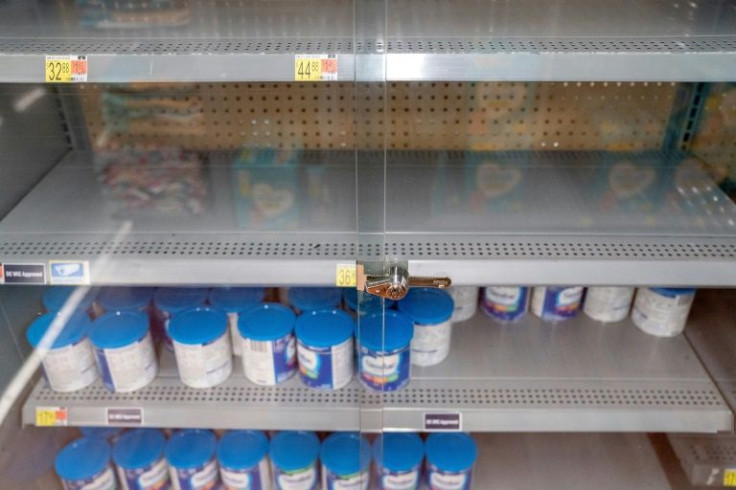White House Announces Plans To Ease Infant Formula Shortage Amid Concerns For Bottle-Fed Children
KEY POINTS
- Abbott Nutrition recalled several lots of infant formula from its Sturgis, Michigan plant, in February
- The White House seeks to expand access, increase imports and crack down on price-gougers
- Two of four infants who suffered bacterial infections after consuming the Abbott products died
The White House on Thursday announced plans to ease the baby formula shortage in the country that has raised concerns for non-breastfeeding babies and children with medical conditions who need specialty formula. The shortage was fueled in February when Abbott Nutrition recalled a group of milk products following a string of Cronobacter sakazakii infections in babies who consumed the recalled products.
The Biden administration, as part of the measures to ease the shortage, seeks to crack down on price gouging of formula sales, increasing imports, and expanding formula access for citizens under the Women, Infants and Children (WIC) program, The Hill reported. A senior administration official said the government will continue to find ways to help improve the production and distribution of baby formula. White House press secretary Jen Psaki said late Thursday that "hoarding" was the bigger problem.
White House announces measures to ease baby formula shortage https://t.co/car3sAbKTv pic.twitter.com/qfwww0TNb6
— The Hill (@thehill) May 13, 2022
.@PressSec on baby formula shortage: "We've already seen an increase in supply over the last couple of weeks. What we are seeing, which is an enormous problem is people hoarding because they're fearful and people hoarding because they're trying to profit off of fearful parents." pic.twitter.com/BUXayJUK8g
— The Hill (@thehill) May 13, 2022
There have been increasing concerns over the past months as the availability of infant formula went scarce. In particular, parents with children who need specialty formula and those who have little to no opportunity to breastfeed their babies have expressed frustration over the shortage, The New York Times reported.
Some have resorted to rationing, even for children with special needs. Owner of Mount Carmel Pharmacy in the Bronx area, Roger Paganelli, told The New York Post that “hundreds” of children have no choice but to feed on formula due to their medical conditions. “We’re trying to balance and ration as best as we can. It’s a very sensitive situation. These are hard decisions to make,” he said.
Baby formula shortage worsens: White House makes moves to ease product deficithttps://t.co/jCMrEpB7hN
— USA TODAY (@USATODAY) May 13, 2022
Abbott Nutrition, one of the largest suppliers in the country, voluntarily recalled certain lots of Similac, EleCare, and Alimentum powder formula in mid-February following four reports of infants who contracted an infection from the Cronobacter sakazakii bacteria. The said products were manufactured in Sturgis, Michigan. The recall was expanded in March to include a lot of Similac PM 60/40. Two of the four infants who suffered from bacterial infection died, CNBC reported.
Abbott said the bacteria that caused all four infected infants to be hospitalized was found at a plant and not in production areas where the products in question were being made. The company has since shut down the Sturgis plant and said all finished products tested were negative for Cronobacter sakazakii.
Parents across the U.S. are struggling with a baby formula shortage. The problem was worsened by a voluntary recall by Abbott Nutrition, which came after at least four babies were hospitalized and two died after consuming its products, the FDA said. https://t.co/ad7PX8mdeX
— The New York Times (@nytimes) May 9, 2022
The shortage is already a problem in itself, but potential scams related to the matter may become another issue. The Better Business Bureau (BBB) warned of possible scams arising from the shortage that will target parents searching for baby formula. The BBB said one of the potential scams is artificial positive reviews on a website selling formula so people will trust it, after which the scammers will cut off contact after a buyer makes a purchase.
The White House is expected to further detail its plans for easing the baby formula shortage in the coming days.

© Copyright IBTimes 2024. All rights reserved.












